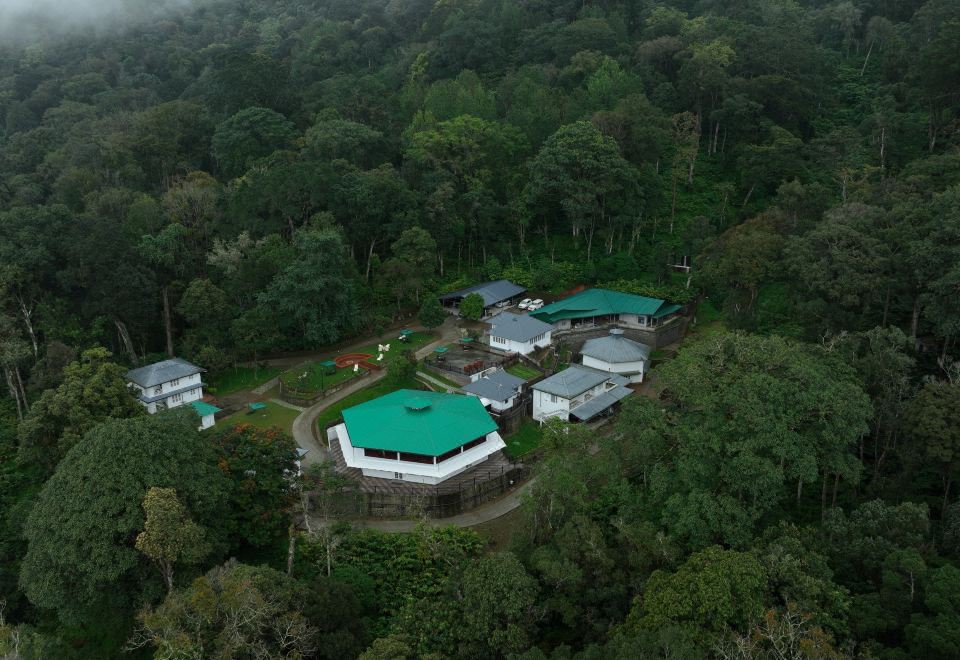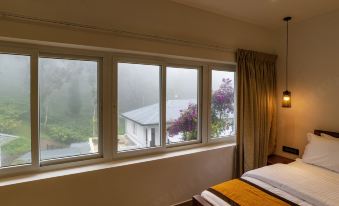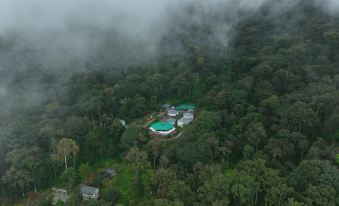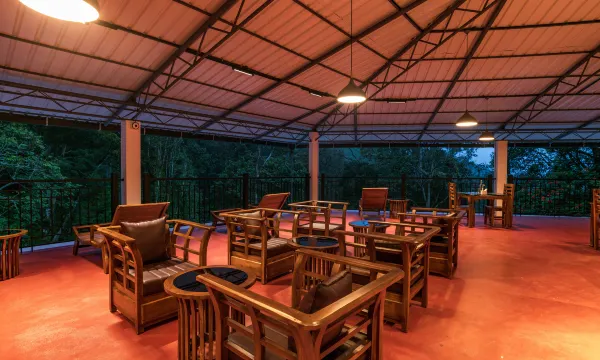Makayiram Retreat
1 night
Rooms and Guests
1 room, 2 adults, 0 children
All Properties in Idukki
Makayiram Retreat
Opened in 2023
Bisonvally Road Pothamedu, Idukki, Kerala 685612, India
Show on Map
At Makayiram Retreat, exceptional service and top-notch amenities create a memorable experience for guests. Complimentary internet access is available in the resort to ensure you stay connected during your visit.Complimentary parking is available for guests. Chilly nights become more delightful than balmy ones, as you snuggle near the resort's inviting hearth.Due to health concerns, smoking is strictly prohibited within the entire premises of resort. For the health and well-being of all guests and staff, smoking is restricted exclusively to assigned zones. At Makayiram Retreat, each day commences with a scrumptious breakfast offered at no additional cost. All adore a delightful cup of coffee! An on-site coffee shop ensures you can relish a cup of authentic, freshly-brewed coffee every morning -- or whenever you desire it.Allow your journey to be free from the pangs of hunger! On-site eateries offer delicious and accessible meal choices.Show More
We Price Match







4.9/5Outstanding
·Cleanliness: 4.9
All 13 Reviews
Amenities
Parking24-hour front deskWi-Fi in public areasHikingRestaurantCafeTaxi booking serviceBicycle rentalPlayground
All Amenities
Surroundings
Landmarks: MAR Rock view
(250m)
Landmarks: Tata Tea Garden
(260m)
Landmarks: Ottamaram
(790m)
Map
Rooms
Guest Reviews
Policies
Services & Amenities

4
Orion Suite 2
Bedroom 1:1 Queen bed ● Living Room:1 Bunk bed
Window faces hallway
Free Wi-Fi
Non-smoking
Shower
Tea bags
Towels
Toothbrushes
Check Availability

Standard Twin Room With Mountain View
Free Wi-Fi
Non-smoking
Shower
Electric fan
Tea bags
Mountain view
Check Availability

5
Capricorn Ground Floor
Bedroom 1:1 Queen bed ● Bedroom 2:1 Queen bed ● Living Room:1 Sofa bed
Window faces hallway
Free Wi-Fi
Non-smoking
Shower
Tea bags
Towels
Toothbrushes
Check Availability

4
Orion Suite 5
Bedroom 1:1 Queen bed ● Living Room:1 Sofa bed
Window faces hallway
Free Wi-Fi
Non-smoking
Shower
Tea bags
Towels
Toothbrushes
Check Availability

1
Suite With Garden View
Bedroom 1:1 Double bed ● Living Room:1 Sofa bed
Free Wi-Fi
Non-smoking
Shower
Electric fan
Tea bags
Mountain view
Check Availability

5
Capricorn First Floor
Bedroom 1:1 Queen bed ● Bedroom 2:1 Queen bed ● Living Room:1 Sofa bed
Window faces hallway
Free Wi-Fi
Non-smoking
Shower
Tea bags
Towels
Toothbrushes
Check Availability

4
Orion Suite 3
Bedroom 1:1 Queen bed ● Living Room:1 Sofa bed
Window faces hallway
Free Wi-Fi
Non-smoking
Shower
Tea bags
Towels
Toothbrushes
Check Availability

4
Orion Suite 1
Bedroom 1:1 Queen bed ● Living Room:1 Sofa bed
Window faces hallway
Free Wi-Fi
Non-smoking
Shower
Tea bags
Towels
Toothbrushes
Check Availability

4
Orion Suite 4
Bedroom 1:1 Queen bed ● Living Room:1 Sofa bed
Window faces hallway
Free Wi-Fi
Non-smoking
Shower
Tea bags
Towels
Toothbrushes
Check Availability

3
Gemini Room
2 Single bed
Window faces hallway
Free Wi-Fi
Non-smoking
Shower
Tea bags
Towels
Toothbrushes
Check Availability

6
Taurus Cottage
Bedroom 1:1 Single bed and 1 King bed ● Bedroom 2:1 Queen bed
Window faces hallway
Free Wi-Fi
Non-smoking
Shower
Tea bags
Towels
Toothbrushes
Check Availability

5
Gemini Suite
Bedroom 1:1 Queen bed ● Living Room:1 Sofa bed
Window faces hallway
Free Wi-Fi
Non-smoking
Shower
Tea bags
Towels
Toothbrushes
Check Availability
Hide Room Types
Guest Reviews
4.9/5
Outstanding
13 reviews
 Verified Reviews
Verified Reviews- Cleanliness4.9
- Amenities4.9
- Location4.9
- Service4.9
Average for similar properties in Idukki
Book now and leave a review after your stay to earn up to 120 Trip Coins (approx. ₹ 101.14). Trip Coins can be used to save instantly on room rates.

Guest User
May 26, 2024

Calm place internet is not steady rooms are decent breakfast spread can be better very peaceful place

Guest User
May 22, 2024

Orion rooms are small, limited food items, resort located somewhat far from city centre and if we are driving at night to resort will get fear in dark roads, location and climate in resort is awesome and restrooms are full cleaned and neat

Guest User
May 14, 2024

Property is beautiful and well maintained. Exceptional service high quality and tasty food. Highly recommend for families and friends. Missed the resort tour due to rains. Worth second visit.

Guest User
May 7, 2024

The property is excellent. We were family family with 5 members. Dont feel like venturing out as the property is vast and there is a lot to explore including a 3 kms trek inside. The property is new and that is definitely a plus. We stayed in cottage named taurus. The cottage was very spacious. The staff is very helpful. The resort does not have a pool and they will be constructing a tempreture controlled swimming pool and that will add to the many pro's of the resort. The one short coming is that the food has to be ordered 1 to 1. 5 hours in advance. The buffet breakfast was ok and basic. I am sure the restaurant service will keep on improving. The staff makes a lot of effort to please the guest. I will definitely visit the property in future.

Guest User
May 2, 2024

It’s a joyfully stay in the lap of nature, surrounded by cardamom and tea estates, relaxing and pleasant stay in the midst of busy life, staff, food, ambiance is excellent.

Guest User
April 2, 2024

Our stay at Makayiram Retreat Resort in Munnar was exceptional. Surrounded by a beautiful cardamom plantation, the retreat is new and well-maintained. The staff's service was outstanding, and they went above and beyond to ensure our comfort. The Taurus Cottage was spacious, clean, and well-furnished. The food was delicious, and we appreciated the complimentary barbecue. Although we missed the plantation trail walk, the nearby sunset viewpoint was stunning. Overall, a fantastic experience with great amenities and service. Highly recommend!

Guest User
March 1, 2024

Makayiram Retreat ambience is wonderful 💚 Rooms are nice,neat & classy .. Staff attitude is awesome✌🏼 ... Good food🍲🍛 .. Best place for bird watching & a peaceful place to melt in with nature🌳🐦🌱🌄

Guest User
February 15, 2024

Shinrin-yoku. A Japanese term denoting immersion in the tranquility and peace of the forest, where one can absorb the sounds and sights that abound in nature- something city-weary souls are hankering for. It’s a universal experience that finds resonance in several cultures, be it the Nordic philosophy of hygge - a Danish word meaning “valiant, comfort, joy”- or the Advaitic concept of tat tvam asi – thou art that, to name just two. Each of these philosophical constructs points to the need of the human soul to connect with the natural environment and with one’s innermost self in pursuit of the all too elusive peace of mind. Shinrin-yoku is the driving force behind the Makayiram retreat - a green oasis nestled in a cardamom plantation surrounded by a primeval forest close to Pallivasal village in Idukki district in Kerala. It’s truly a state of mind rather than a place, a sanctuary where one can bury one’s anxieties and soak in the sensory experiences that can fuel creativity and renewal. Encapsulating 14 living spaces named after the various star signs and a central circular structure that is the dining area, the whole complex is an aesthetic delight, painted in gentle shades of green and grey and brown and white that merge with the environment in which it is encased. The pleasant décor of the cottages and buildings, the lovingly tended garden, the cardamom plantation, the bluish green hills that form a backdrop, and last but not least, the six acres of forest land that has been allowed to grow wild amid the 55 acre property, all feed into the feeling of well being and peace that engulfs the guest as soon he/she steps into the retreat. As also pleasant demeanour of the 17 staff who are anxious to pander to every wish of the guests. The longtime staff who tend to the plantation and the garden also exude a sense of contentment and ownership which is harmonious with the environment. A perfect example is Muniyamma, the septuagenarian gardener who insists on tending to her precious blooms long past her retirement. The theme of sustainability that marks out Makayiram from other retreats is extended to the culinary creations offered to guests. Most of the vegetarian dishes are prepared using organic produce grown in the garden. A further example of the ecological consciousness is the concept of repurposing and recycling that has been integrated into the structure. The buildings themselves are erstwhile cattle sheds which have been converted into habitats for human beings. Stumps of trees form seats where guests can relax after a walk. The emphasis on sustainability is also discernible in the poster which describes visually and in words the varied species of birds and butterflies that can be found in the retreat. Dotting the walls of the dining room are also maps of India’s traditional water conservation techniques, rare rice varieties found in the country, handloom fabrics that span several states and centuries. Alongside are also maps depicting t

Guest User
January 16, 2024

Very good atmosphere with good service's, but in cast wise it was little bit high , good quantity in food but want to improve in quality and taste and we want some kids playing items, kids are gets boring, for working persons it's a good place to take peaceful rest
Property Policies
Check-in and Check-out Times
Check-in: 14:00–22:00
Check-out: 06:00–11:00
Front desk hours: 24/7
Child Policies
Children of all ages are welcome at this property.
Additional fees may be charged for children using existing beds. Add the number of children to get a more accurate price.
Cots and Extra Beds
Extra bed and crib policies may vary according to room type. Please refer to the room type details for more information.
Breakfast
TypeContinental
StyleA la carte
| Age | Fee |
|---|---|
Children 17 years old and under | Contact hotel |
Adult | Contact hotel |
Additional breakfast fees are not included in the total and need to be paid at the property.
Property Description
- Opened: 2023
- Number of Rooms: 10
At Makayiram Retreat, exceptional service and top-notch amenities create a memorable experience for guests. Complimentary internet access is available in the resort to ensure you stay connected during your visit.Complimentary parking is available for guests. Chilly nights become more delightful than balmy ones, as you snuggle near the resort's inviting hearth.Due to health concerns, smoking is strictly prohibited within the entire premises of resort. For the health and well-being of all guests and staff, smoking is restricted exclusively to assigned zones. At Makayiram Retreat, each day commences with a scrumptious breakfast offered at no additional cost. All adore a delightful cup of coffee! An on-site coffee shop ensures you can relish a cup of authentic, freshly-brewed coffee every morning -- or whenever you desire it.Allow your journey to be free from the pangs of hunger! On-site eateries offer delicious and accessible meal choices.
Services & Amenities
Most Popular Amenities
Parking
24-hour front desk
Wi-Fi in public areas
Hiking
Restaurant
Cafe
Taxi booking service
Bicycle rental
Playground

Restaurant
Restaurant
Restaurant
Dining options: Property guests only
Show More